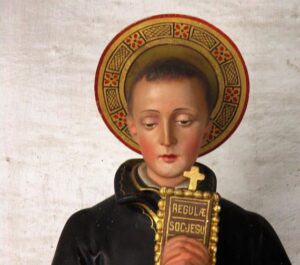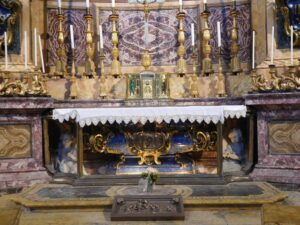
St. John Berchmans was a gifted Jesuit seminarian who lived a short life of exemplary virtue. John was born in 1599 to a master shoemaker’s family in Belgium. From early childhood, he wished to become a priest. He was notably affectionate and kind, and he possessed a cheerful disposition. He was very bright, had a very good memory and was eager to learn.
DEVOTED ALTAR SERVER
From the age of seven, he greatly desired to serve at Mass, and would often serve two or more Masses per day, beginning very early in the morning. He had an impressive capacity to retain and even memorize the homilies delivered at each Mass. By the time he was thirteen, his family had fallen on hard times, and, in order to remain in school, he needed to work as a household servant for a priest. John was extraordinarily devout. He often made pilgrimages to a sanctuary shrine at Montaigu, several miles from Diest, where he would become engrossed in meditative prayer. He also walked barefooted and prayed the Stations of the Cross at dusk on Fridays.
In 1615, the Jesuits established a new college at Malines, in Belgium. John became one of the first students to enroll, despite the misgivings of his family. He was an excellent student and joined the Sodality of the Blessed Virgin. When he informed his family that he intended to enter the Society of Jesus, his father removed him from the college and took him to the nearby Franciscans.
ENTRY TO THE JESUITS
Despite the pleas of his father and the case made by the Franciscans, John returned to the Jesuit college and was accepted as a novice even though his father had cut him off from financial support. During his novitiate, his friendliness and likability endeared him to those around him, and he again excelled in his studies. In 1618, after making first vows, he went to Antwerp for further study in philosophy. Just weeks later, he was transferred for studies at Rome. He set out on foot for the nine hundred mile journey with a companion, carrying his belongings in a pack on his back. At the Roman College, John again mastered his studies and was well-liked by those around him, while, at the same time, striving for perfection in even the smallest detail of his tasks.

By his firm but cheerful adherence to its tenets, he demonstrated that he truly loved his order and its rules. At the college, he studied languages and philosophy. After completing his first two years, he advanced to begin his third year of philosophy studies in 1621. All seemed well for him to have a bright future as a priest scholar.
In early August, John was selected to participate in a philosophical debate and discussion at the Greek College, which was at that time operated by the Dominican order. He opened the debate with a brilliant address and returned to his own college.
SUDDEN ILLNESS
Before he could return the following day, he was overtaken by a powerful fever. This infection was known as Roman fever, but it would now be known as malaria. The illness robbed him of his strength, and he died just days later, on August 13, 1621 at age twenty-two. It seemed obvious to those who knew him that he was a saintly young man, and a large number of people came to show their respect in the days following his death. Many who prayed for his intercession reported miraculous answers to those prayers. Before the year concluded, the Duke of Aarschot near John’s hometown of Diest, petitioned the Holy See to open the cause for his canonization. John’s remains were eventually interred at Saint Ignatius Church in Rome, with the exception of his heart, which was returned to Belgium.

AMERICAN CONNECTION
The story of his canonization would be of interest to Americans, because a miracle which was attributed to his intercession was experienced by a young novice at the Academy of the Sacred Heart in Grand Coteau, Louisiana in 1866. Mary Wilson was weakened to the point of only being able to digest liquids. After praying to then-Blessed John Berchmans, he appeared to her and she was completely and immediately healed, leading to his canonization in 1888. The Jesuits established a parish in nearby Shreveport in 1902, which they named in honor of St. John Berchmans. In 1986, when Shreveport was instituted as a diocese, this church became its cathedral parish.
Found among St. John Berchmans’s personal belongings was a chaplet he had composed to protect the virtue of purity, known as the Little Rosary of the Immaculate Conception. Because he is the patron of altar servers, there is a group known as the St. John Berchmans Sanctuary Society which is a parish-based organization for altar servers. Because the Jesuits, as missionaries, have established themselves the world over, there are dozens of schools and parishes placed under this saint’s intercession from Belgium to India to the Philippines. His feast day is August 13.
